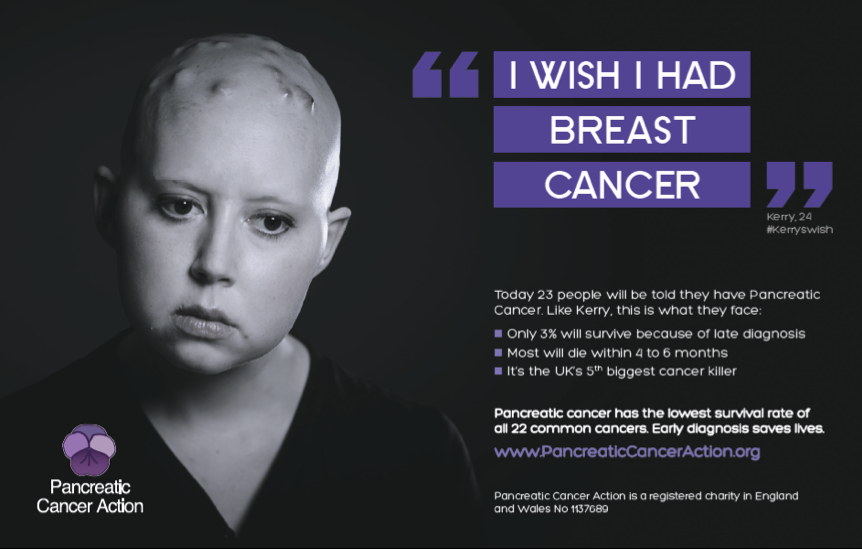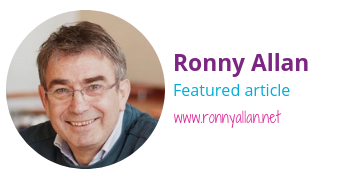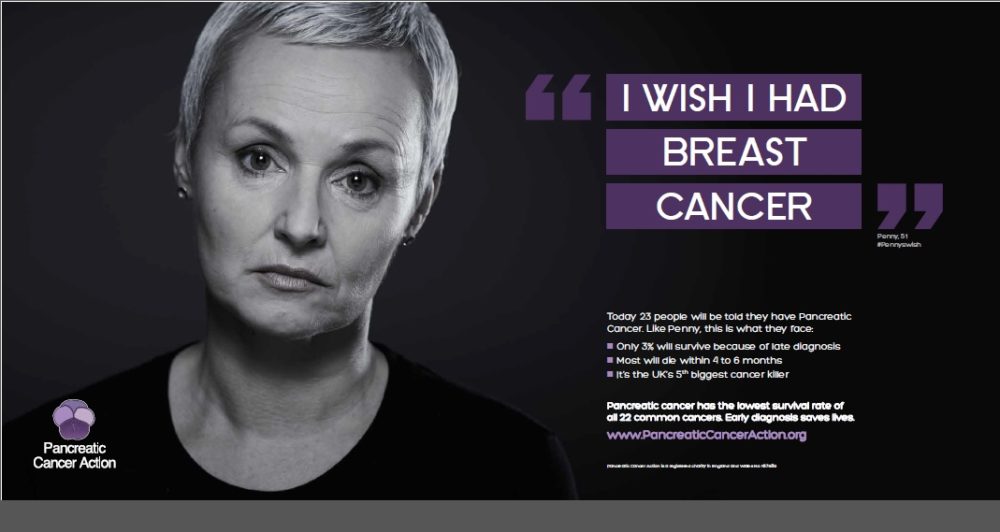I wish I had another cancer
In 2014, we launched the UK’s first pancreatic cancer awareness advertising campaign, titled: I Wish I Had.
The campaign was hugely successful, reaching over 20 million people in the UK alone and millions more across the globe. The focus of the campaign was to share real life stories of pancreatic cancer patients at the time who wished they were battling a cancer with better survival rate statistics.
Although highly controversial, the campaigns ultimate goal was to raise awareness of the signs and symptoms of pancreatic cancer and save lives through early diagnosis.
Here, Ronny Allan, a neuroendocrine cancer patient, reflects on our campaign and the relevance it still has today.

I’ve seen the term ‘Cancer Olympics’ many times on my social media travels, it’s been used in several contexts. For example, my friend Dr Robin McGee uses it to describe her ordeal with late stage bowel cancer and judging by the cover of her book, the analogy is the hurdles she had to jump to get the right treatment (many of you will relate to that).
Another example I see is the race to claim a cancer is somehow ‘worse’ than other cancers, i.e. ‘my cancer is far worse than yours’. Ironically, although some cancers are almost certainly worse than others (for example in prognostic terms), it seems like a race to the bottom as patients fight for the ‘top’ spot. It works both ways as some people perceive they have had or are having a better cancer experience than others, and that can often lead to a sense of guilt, i.e. ‘your cancer is much worse than mine, I shouldn’t really complain too much’.
It can be normal to experience these emotions, and with such wide and varying cancer experiences, different personal circumstances, even (say) the worst stages and grades cannot always be used to justify the ‘gold medal’ position in this ironic version of cancer Olympics. Take my Neuroendocrine Cancer for example, I have the highest stage but an intermediate grade, so my sub type is not particularly aggressive in comparison with other cancers or even other sub-types of my own cancer. However,in many ways it’s a deceiving and silent disease and very often people are not diagnosed until a late stage where the disease becomes incurable. Prognostics for many sub-types are good but living with the disease has many consequences. This sounds like a bad deal and for some it can be. But don’t tell me I have a ‘good’ cancer. Neuroendocrine Cancer does have aggressive types with significantly different prognostic outcomes than the more common and less aggressive variants.
So let’s turn my personal cancer Olympics analogy round the other way. Let’s say you have a very aggressive cancer with terrible and frightening prognostic statistics. I would certainly not criticise anyone or accuse them of deliberately playing a cancer Olympics ‘game’ for suggesting they wished they had another cancer in this scenario.
I want to focus an example on Pancreatic Cancer, an awful cancer with awful prognostic outcomes. Using UK statistics, less than 7% of patients survive 5 years, it has the worst survival rate of all 22 common cancers. The headline and key awareness and campaigning message is that these prognostics have not changed much in 40 years. There are similar statistics in many countries. Pancreatic Cancer organisations worldwide are therefore campaigning robustly for more resources and funding to tackle and improve these statistics through more research and clinical trials. They are also doing what they can with their own prevention and early diagnosis campaigns with limited funding. With this particular disease, given the survival statistics, awareness is vital and it can save lives, one of the reasons I regularly publish Pancreatic Cancer symptoms.
One of the most compelling, bold and disruptive (in the context of shaking things up) campaigns I’ve seen, is the ‘I wish I had another cancer’ campaign from a UK-based Pancreatic Cancer organisation. It certainly caused a storm, making it to billboards in many towns, London underground adverts, several national newspapers and appearances on national TV. One broadcaster named it the ‘Envy’ campaign.
Clearly I would rather not be diagnosed with any cancer. But if I was to be brutally honest, I’m glad I wasn’t diagnosed with a more aggressive disease, otherwise I might not be here now enjoying life with my family. So I totally understand the motivations of this campaign and why I fully support the 2019 twitter message from one of its creators Ali Stunt (CEO of Pancreatic Cancer Action)

